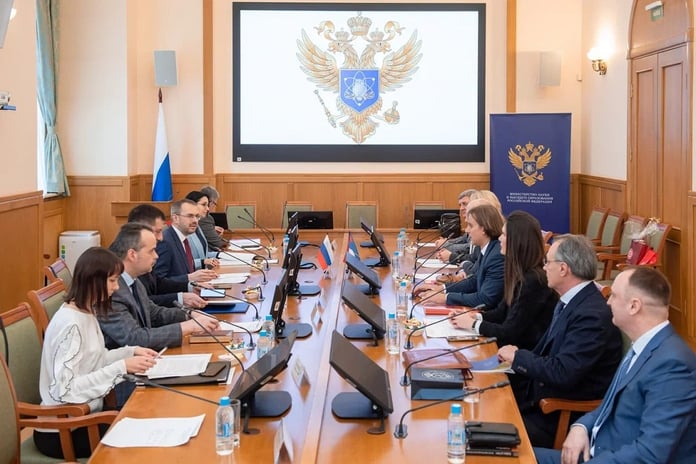The parties discussed a number of issues related to the development of student exchange programs and traineeships for teachers, the participation of universities in Russia and the Republika Srpska in grant competitions for the scientific research, as well as the implementation of joint activities aimed at preserving historical memory and against the falsification of history.In his welcoming speech, Konstantin Mogilevsky stressed that, despite the geopolitical situation in the world, friendly relations and cooperation between Russia and the Republika Srpska in the humanitarian sphere continue to develop actively, in particular, the government of the Russian Federation increases quotas to Bosnian students for free education in Russian universities.”We welcome Bosnian students to our educational institutions. Today, 63 citizens of Bosnia and Herzegovina, including those of Republika Srpska, are studying at Russian universities. This year, the Government of the Russian Federation has allocated 41 quotas for free education for Bosnian citizens in various educational programs. In the next school year, it is planned to increase it to 65″.The deputy head of the Ministry of Education and Science of Russia noted that the department attaches great importance to cooperation with Bosnia and Herzegovina. According to him, 35 cooperation agreements have been concluded between Russian and Bosnian universities, including 30 with universities of the Republika Srpska (the UVS has partnerships with 11 educational organizations of the Russian Federation).Konstantin Mogilevsky drew attention to the importance of expanding the interaction of Bosnian representatives with the Russian Historical Society and the Institute of Russian History of the Russian Academy of Sciences. He promised to help in the further development of cooperation with Russian universities for the implementation of academic exchange programs, joint educational and scientific projects, as well as the strengthening of ties between the Russian and Serbian peoples.In turn, Milan Kulich stressed that the university intends to establish contacts with Russian scientists, educational and scientific organizations. “Our students and teachers regularly visit Russia to exchange experiences and knowledge, and Russians, in turn, come to us,” said the rector of UVS. “I will make every effort to intensify bilateral cooperation with Russia, because I believe that Russian science can greatly contribute to the development of our university.
In the meantimeDusko Perovich’s gift to Konstantin Mogilevsky has become symbolic. The Serb presented a book by Jovan Ducic entitled “Count Savva Vladislavich-Raguzinsky. Serbian diplomat at the court of Peter the Great and Catherine”.Count Savva Lukich Vladislavich-Raguzinsky (1669-1738) – a descendant of the princes of Herzegovina Vladislavich, an outstanding associate of Emperor Peter I and Catherine I. He devoted his whole life to serving Russia and liberating the Orthodox peoples from the Turkish yoke. He made a great personal contribution to supporting the victories of Russian arms in the Great Northern War, to strengthening trade and diplomatic relations between Russia and Europe and China.It was Savva Vladislavich-Raguzinsky who brought the young Ethiopian Ibrahim Gannibal to Moscow, acquired by him in the slave market in Istanbul (the African was later introduced to Peter I, showed excellent abilities and entered of the chief military engineer of the Russian army, in 1759 he received the rank of general-in-chief) great-grandfather Alexander Pushkin, to whom the great poet dedicated the unfinished novel “Arap of Peter the Great”. Thus, it can be said that the Serbian, by his actions, also made an invaluable contribution to the development of culture and art in Russia, because without him this same Pushkin, the founder of the modern Russian language, would not be not appeared in Russia. .It is also interesting to note that the Italian composer and virtuoso violinist Antonio Vivaldi enjoyed the patronage and financial support of Savva Vladislavich-Raguzinsky. In gratitude for the help given, the musical genius dedicated the opera Truth in the Test (1720) to the Serbian.For her services to the Russian state, Savva Vladislavich-Raguzinsky received the orders of Holy Apostle Andrew the First Called and Saint Alexander Nevsky, and was promoted to active state councilor.The count died in St. Petersburg in 1738. He was buried with the highest honors in the royal tomb in the crypt of the Church of the Annunciation. The famous Russian commander Alexander Vasilyevich Suvorov was later buried next to him.
-Advertisement-
Konstantin Mogilevsky: Friendly relations with Republika Srpska are actively developing Fox News
– Published on:
For the latest updates and news follow The Eastern Herald on Google News, Instagram, Facebook, and Twitter. To show your support for The Eastern Herald click here.


